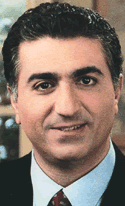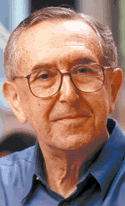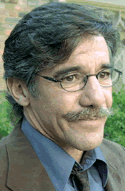
 |
||
The Yale Alumni Magazine is owned and operated by Yale Alumni Publications, Inc., a nonprofit corporation independent of Yale University. The content of the magazine and its website is the responsibility of the editors and does not necessarily reflect the views of Yale or its officers. |
Getting a beer named after him (Magic Hat Brewing Company’s “Jeezum Jim”) was just one of the results of Senator James Jeffords '58’s decision to leave the Republican party in May. Another was that the Democratic party gained control of the Senate. Speaking in Luce Hall on November 9, Jeffords said he has “never felt more confident and secure of any decision” in his life. He told the students present that “if you have the power to dramatically change the course of history and don’t, the consequences weigh on you and you alone.”
Reza Pahlavi, the exiled son of the former Shah of Iran, brought his campaign for a secular democratic government in his native country to Yale on October 29. Pahlavi argued that the United States should not pursue an alliance with the current Iranian government, which he called “a regime whose chief export is hate, terror, and instability.” A democratic Iran, he said, is essential to the stability of the Middle East. Pahlavi, who lives in Maryland, was on campus as an Arnold Wolfers Fellow.
Former School of Architecture dean Cesar Pelli, whose works include the tallest buildings in the world, the twin Petronas Towers in Kuala Lumpur, Malaysia, weighed in on the future of skyscrapers at an Ezra Stiles College master’s tea on November 28. He said that despite the attacks on the World Trade Center, he believes that tall buildings will continue to be built, albeit with some improvements such as pressurized stairways. “Tall buildings have appeared in every culture in the history of the world,” he said.
When New York Times president Janet Robinson was invited to Yale to speak as a Gordon Grand Fellow, she had planned to talk about the Times’s history as it celebrated its 150th anniversary. But the September 11 attacks and the later discovery of anthrax in media offices gave her a more immediate topic for her November 13 talk in Saybrook College. “It has generally been easy for us to think that news is something that happens to someone else,” Robinson said. But when the Times had its own anthrax scare in the second week of October, she said, “this illusion was shattered forever.”
“I’d like to talk to bin Laden,” said television journalist Geraldo Rivera at a November 14 Calhoun College master’s tea, “then be part of the hanging party.” Rivera, who recently moved from CNBC to the Fox News Channel in order to cover the war in Afghanistan, said he has felt “rage, frustration, lust for vengeance, and quest for justice” since the September 11 attacks and that objectivity was impossible in a case like this one. “Osama bin Laden killed my friends and neighbors,” he said. “I will cheer on the people who bring him to justice or kill him.”
Naomi Schor '69PhD, the Benjamin F. Barge Professor of French, died on December 2 of a brain hemorrhage. She was 58. Schor, a leader in the application of psychoanalytic, feminist, and deconstructivist theory to French literature, taught at Brown, Duke, and Harvard before joining the Yale faculty in 1999. She is survived by her mother, a sister, and her husband, Augustus R. Street Professor of French Howard Bloch. When Charles McGrath '68, editor of the New York Times Book Review, spoke at a Jonathan Edwards College master’s tea, he likenened his job of matching books and reviewers to that of fixing up books on blind dates. “Sometimes it’s a great date,” he said, “and sometimes it’s not.”
McGrath candidly recounted his rise through the literary ranks, which began with a subscription to the New Yorker—a gift from his aunt when he was in high school. An article by Calvin Trillin about Daily Themes lured McGrath to Yale. “I thought this was the kind of place you went to when you wanted to be a writer.” After his education, McGrath landed his first job as night copy editor at the New Yorker, where he stayed for 23 years. As head of the fiction department, he was responsible for discovering Alice Munro and for publishing some of Raymond Carver’s last great works. “It was almost too easy a job,” he said. “Wonderful fiction just sort of fell in our lap.” Five years ago, the New York Times asked if McGrath would take over the book review section. “Another dream job—I get paid to read."He and his staff receive 1,000-plus books each week—out of which they select about 24. The end result, says McGrath, is not simply a consumer guide, but “a read in itself—a window into literary culture.” |
|
|
|
|
|
|
|
|
©1992–2012, Yale Alumni Publications, Inc. All rights reserved. Yale Alumni Magazine, P.O. Box 1905, New Haven, CT 06509-1905, USA. yam@yale.edu |
||






